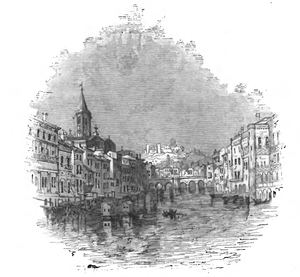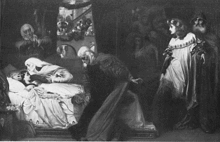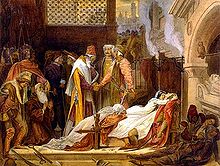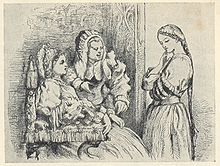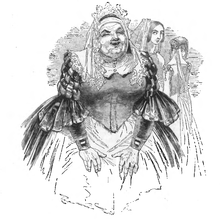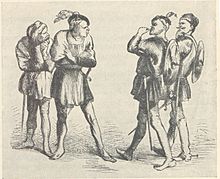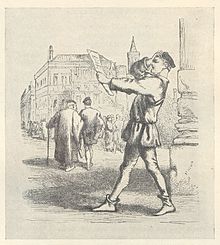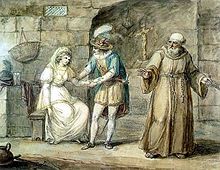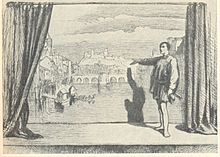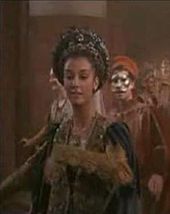- Characters in Romeo and Juliet
-
The following is a list of characters in William Shakespeare's Romeo and Juliet sorted by family allegiance.
Contents
House of Escalus
Prince Escalus
Prince Escalus, the Prince of Verona, is the mediator of the feuding families. Escalus is the voice of authority in Verona. He appears only three times within the text and only to administer justice following major events in the feud between the Capulet and Montague families. He first punishes Capulet and Montague in I.i for the quarrel between Tybalt, Benvolio, and a handful of servants. He returns in III.i, too late to stop the fatal brawls between Tybalt and Mercutio and, subsequently, Tybalt and Romeo. Escalus is prepared to execute Romeo for his offense—Romeo killing Tybalt—but lightens the sentence to lifetime banishment from Verona when Benvolio insists that Tybalt started the quarrel by murdering Mercutio, a kinsman to the Prince. He returns in the final scene—V.iii—following the double suicide of Romeo and Juliet and at last orders the lords of the feuding families to make peace.
Count Paris
Main article: Count ParisCount Paris (County Paris in the text)[1][2] is a kinsman of Prince Escalus and seeks to marry Juliet. He is described as handsome, somewhat self-absorbed, and very wealthy.
Paris makes his first appearance in Act I, Scene II, wherein he expresses his wish to make Juliet his wife and the mother of his children. Capulet demurs, citing his daughter's young age as a reason and telling him to wait until she is more mature. (Paris disagrees, however.) Nevertheless, he invites Paris to attend a family ball being held that evening with permission to woo and attract Juliet. Later in the play, however, Juliet refuses to become Paris' "joyful bride" after her cousin Tybalt dies by her new husband Romeo's hand, proclaiming that she now wants nothing to do with Paris. Her parents threaten to disown her if she will not agree to the marriage. Then, while at Laurence's cell at the church, Paris tries to woo her by repeatedly saying that she is his wife and that they are to be married on Thursday. He kisses her and then leaves the cell, prompting Juliet to angrily threaten to kill herself with a knife. His final appearance in the play is in the cemetery where Juliet is "laid to rest" in the Capulet family tomb. Believing her to be dead, the Count Paris has come to mourn her death in solitude and privacy sending his manservant away. He professes his love to Juliet saying he will nightly weep for her (Act V, Scene III). Shortly thereafter Romeo arrives and Paris sees him and thinks he is trying to vandilise the tomb so he trys to arrest him, they fight, Romeo kills Paris and Paris's death wish was to be put next to Juliet in the tomb.
Mercutio
Main article: MercutioSee also: #ValentineMercutio is a relative of Prince Escalus and Count Paris, and is a close friend of Romeo and his cousin Benvolio. The invitation to the Capulet's party reveals that he has a brother named Valentine. Mercutio is apt to make long, drawn out speeches (the most famous of which is the Queen Mab speech), and is generally thought to be reckless, a jester, and a free spirit. Due to his reckless and flamboyant personality, Mercutio is one of Shakespeare's most popular characters. Mercutio is the instigator of many fights with his rather mean spirited humor, and often insults Tybalt Capulet, a renowned swordsman. It is Mercutio's temper that leads to Tybalt's death, and Romeo's banishment and the tragedy that follows.
After Romeo receives a death threat from Tybalt, Mercutio expects Romeo to engage Tybalt in a duel. However, Romeo refuses to fight Tybalt, as Tybalt is Juliet's cousin and therefore his kinsman. Not knowing this, Mercutio is incensed, and decides to fight Tybalt himself. Romeo, not wanting his best friend or his relative to get hurt, intervenes, causing Mercutio to be killed by Tybalt stabbing under Romeo's arm.
Before he dies, Mercutio casts "a plague o' both your houses!" He makes one final pun before he dies: "Ask for me tomorrow, and you shall find me a grave man". In revenge for the murder of his best friend, Romeo slays Tybalt, thus leading to Romeo's banishment from Verona and the increasingly tragic turn of events that follows.
Page to Mercutio
A page is present for Mercutio's fight with Tybalt. Before he dies, Mercutio angrily calls for his page to "fetch a surgeon!"
Page to Paris
Another page accompanies Paris to the Capulet's crypt when he goes to mourn Juliet. He stands guard as Paris enters, ordered to "whistle then to me, / As signal that thou hear'st something approach". When Romeo and Paris break into a brawl, he runs away to call the Watch. He returns with the Watch too late to stop the fray, and later testifies to the Prince of Paris's intentions.
House of Capulet
The name of the Capulet family (in Italian, the Capuleti) was an actual political faction of the 13th century.[3]
Capulet
Capulet is the patriarch of the Capulet family, the father of Juliet, and uncle of Tybalt. He is very wealthy, but he is not an aristocrat; that is, it would be incorrect to refer to him as "Lord Capulet".[4] He is sometimes commanding but also convivial, as at the ball. When Tybalt tries to incite a duel with Romeo, while at the party, Capulet tries to calm him and then threatens to throw him out of the family if he does not control his temper; he does the same to his daughter later in the play.
Hang thee, young baggage! disobedient wretch!
I tell thee what: get thee to church o' Thursday,
Or never after look me in the face
And you be mine, I'll give you to my friend;
And you be not, hang, beg, starve, die in the streets!Capulet's ultimatum to Juliet Romeo and Juliet[5]Capulet believes he knows what is best for Juliet. He says that his consent to the marriage depends upon what she wants and tells Paris that if he wants to marry her he should wait a while then ask her. Later however, when Juliet is grieving over Romeo being sent away, Capulet thinks her sorrow is due to Tybalt's death and in a misguided attempt to cheer her up, he wants to surprise her by arranging a marriage between her and Count Paris – the catch is that she has to be "ruled" by her father and to accept the proposal. When she refuses to become Paris's "joyful bride", saying that she can "never be proud of what she hates", he becomes furious, threatening to make her a street urchin, calling her "hilding" (meaning "slut" or "whore"), "unworthy", "young baggage" and "disobedient wretch" (along with "green-sickness carrion" and "tallow-face"), as well as saying that God giving Juliet to them was a "curse" and that he now realizes that he and his wife had one child too many when Juliet was born (in The Tragical History of Romeus and Juliet, he not only threatens to turn her out but to sentence her to rotting away in prison if she does not obey her parents' orders). He then storms away, with his wife rejecting Juliet before following suit. He fixes the day of the marriage for Thursday and suddenly advances it to Wednesday out of anger and impulse. His actions indicate that his daughter's wants were irrelevant all the way up to the point when he sees her unconscious on her bed (presumably dead) and later when she is truly dead during the play's final scene.
Capulet's wife
Capulet's wife is the matriarch of the house of Capulet, and Juliet's mother. She plays a larger role than Montague's wife, appearing in several scenes. In Act One, Scene three, she refuses to talk to her daughter about marriage, as she feels uncomfortable about it, but in Scene four, she is pleased about Count Paris's "interest" in her daughter. When Tybalt is killed in Act Three, she expresses extreme grief and a strong desire for revenge on Romeo. In Act Three, Scene 5, she becomes very angry with Juliet for refusing to marry Paris, and she coldly rejects her, saying "Talk not to me, for I'll not speak a word; do as thou wilt, for I am done with thee". By the final act, she is nearly overcome by the tragic events of the play.[6] We know that Juliet was born when her mother was 14, thus she is about 28 years old, and her husband is many years older than her. Calling her "Lady Capulet" is a modern convention; it is an echo of Juliet's form of address in 3.5.65: "my lady mother".[4] In the first quartos the stage direction and speech headings can be "mother", "wife", or even "old lady", but nowhere "Lady Capulet".[4]
Juliet
Main article: Juliet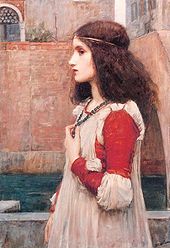 Juliet or The Blue Necklace (1898) by John William Waterhouse
Juliet or The Blue Necklace (1898) by John William Waterhouse
She apparently had younger siblings at some point, but by the time of the play, she is their only surviving child. As a younger child, she was cared for by a Nurse, who is now her confidante. Juliet is approaching her 14th birthday (her 16th in Arthur Brooke's poem). She was born on "Lammas Eve at night" (August 1), so Juliet's birthday is July 31 (1.3.19). Her birthday is "a fortnight hence", putting the action of the play in mid-July (1.3.17).
Shakespeare's Juliet was very young; her father states that she "hath not seen the change of fourteen years" (1.2.9).
The sacred lovers are reunited on the same deathbed. Both their families realized what they had done by trying to separate the star crossed lovers with the effect that the Capulets and Montagues are reunited and their fighting ended. She dies at the end of the play.
Tybalt
Main article: TybaltTybalt is Juliet's hot-headed cousin and a skilled swordsman. Tybalt is angered by the insult of Romeo and Benvolio's uninvited presence at the ball in the Capulets' home. Tybalt shares the same name as the character Tibert/Tybalt the "Prince of Cats" in Reynard the Fox, a point of both mockery and compliment to him in the play. Mercutio repeatedly calls Tybalt "Prince of Cats" referring to Tybalt's expertise with the sword, as he is agile and fast, but also it is an insult as it refers not only to Reynard but to the Italian word cazzo (pr. CAT-so) meaning "penis".
Luigi da Porto adapted the story as Giulietta e Romeo and included it in his Historia novellamente ritrovata di due Nobili Amanti published in 1530.[7] Da Porto drew on Pyramus and Thisbe and Boccacio's Decameron. He gave it much of its modern form, including the names of the lovers, the rival families of Montecchi and Capuleti, and the location in Verona.[8] He also introduces characters corresponding to Shakespeare's Mercutio, Tybalt, and Paris. Da Porto presents his tale as historically true and claims it took place in the days of Bartolomeo II della Scala (a century earlier than Salernitano). Montecchi and Capuleti were actual 13th-century political factions, but the only connection between them is a mention in Dante's Purgatorio as an example of civil dissention.[9]
Tybalt is first seen coming to the aid of his servants who are being attacked by the servants of the Montagues. He is also present at Capulet's feast in act one, scene five, and is the first to recognize Romeo. His last appearance is in act 3 scene 1 where Mecurtio insults Tybalt and ends up fighting with him. Tybalt kills Mecurtio but due to Mecurtio's death Romeo rages and kills Tybalt, This resulted in Romeo's banishment. He is Capulet's nephew and Juliet's cousin. He is close to the Lady Capulet.
Nurse
Main article: Nurse (Romeo and Juliet)The Nurse is a major character in the play, like the Friar she is a neutral character. There has been speculation about her name, as Capulet refers to an "Angelica", but the line can be addressed to either the nurse or Lady Capulet. She is the personal servant (and former nurse) of Juliet. As the primary person to raise Juliet, she is Juliet's confidante, and effectively more of a mother to the girl than Lady Capulet.[10] She is one of the few people, along with Friar Laurence, to be made aware of the blossoming romance between Romeo and Juliet. Her personal history outside of the Capulet house is unknown, other than that, she once had a husband and a daughter, Susan, both of whom are dead.
The Nurse is sent by Juliet in act two, scene four to seek out Romeo the night after their first kiss and exchange of vows. The Nurse finds Romeo and soon after returns to Juliet with news of Romeo's continued affection. It is because of the Nurse's approval that Juliet ultimately decides to go through with marrying him.[citation needed]
Later, the Nurse is overcome with grief at the death of Tybalt, and she runs to Juliet and cries, "He's dead, he's dead, he's dead! We are undone, lady, we are undone! Alack the day! he's gone, he's kill'd, he's dead!"[11] The Nurse is the one to deliver the news of Romeo's banishment to Juliet; in spite of Tybalt's murder coming from Romeo's hands, Juliet seeks out Romeo at Friar Laurence's cell for one final night with him before he flees to Mantua.
When Juliet learns that her parents expect her to marry Paris, the Nurse urges the girl to go ahead with the marriage. Even though Juliet was already married to Romeo, the Nurse felt that Juliet would never see her husband again. Following this, Juliet feels betrayed and decides never to share any more of her secrets with the Nurse.
The Nurse discovers Juliet under the effects of Friar Laurence's potion in act four, scene five, and the grief of her death is as serious as she mourned Tybalt. She is finally, present at the real deathbed of Romeo, Juliet, and Paris, though she does not have any lines.
Peter
Peter appears in Act 1 asking them to read the guest list for the Capulet's party (He cannot read himself) and then invites them to the party as well because he does not know that Benvolio and Romeo are Montagues. Peter is the personal servant of the Nurse. He appears to be a loyal servant, always quick to obey the Nurse. He is chastised for not fighting Mercutio for the Nurse's honor, but insists that he "saw no man use you a pleasure; if I had, / my weapon should quickly have been out".[12] He appears again in act four, scene five in a brief comic relief scene with a number of musicians.
Gregory and Sampson
Gregory and Sampson are the Capulet servants. Gregory is originally hesitant to start a fight. Sampson, however, bites his thumb at Abram, "Which is a disgrace to them, if they bear it". The Montagues then start the fight in earnest, as Benvolio arrives and takes out his sword. Then Tybalt arrives to help his servants, and Benvolio tries to back out of the fight, fearing Tybalt's prowess as a fighter. Both Gregory and Sampson appear to be friends of their master Tybalt.[13]
In the opening scene, the two engage in a dialogue full of puns on "coal" and "eye", each intending to outdo the other and get each other ready to fight Montagues. The rhetorical form is called stychomythia, wherein characters participate in a short, quick exchanges of one-upmanship. Their discussion and brawl in this scene set the stage for the rivalry and hatred which fills the rest of the play.[13]
Anthony, Potpan, unnamed servants
Anthony, Potpan, and two other servants to the Capulet family, play out a short comic scene in act one, scene five, arguing over the preparations for Capulet's feast. Capulet's servants are referenced again in act four, scene one; Capulet orders them to begin preparations for another party, which is the wedding of Juliet and Paris.
Servant to Capulet
A servant to Capulet is sent to deliver party invitations to a number of nobles and friends to Capulet. While walking, he comes upon Romeo and Benvolio and asks them to read the list for him, as he cannot read. As a thank you, he invites the boys to "come and crush a cup of wine," not realizing that they are Montagues. This character may have been intended to be the same as Peter, and is usually identified in scripts either as Peter or as a Clown.
House of Montague
The Montague family (in Italian, the Montecchi) was an actual political faction of the 13th century.[3]
Montague
Old Montague is the patriarch of the house of Montague, and the father of Romeo and uncle to Benvolio. He is very wealthy, but he is not an aristocrat; that is, it would be incorrect to refer to him as "Lord Montague". He worries over Romeo's relationship with Rosaline (with whom Romeo was in love at the beginning of the story), but cannot get through to his son. He later pleads with the Prince to prevent his son from being executed, and gets his wish when the Prince lowers Romeo's punishment to banishment. In the earliest texts his name is actually spelled "Mountague", but Montague now seems well-established.
Montague's wife
Montague's wife is the matriarch of the house of Montague, and the mother of Romeo and aunt of Benvolio. She appears twice within the play: in act one, scene one she first restrains Montague from entering the quarrel himself, and later speaks with Benvolio about the same quarrel. She returns with her husband and the Prince in act three, scene one to see what the trouble is, and is there informed of Romeo's banishment. She dies of grief offstage soon after (mentioned in act five). She is very protective of her son Romeo and is very happy when Benvolio tells her that Romeo was not involved in the brawl that happened between the Capulets and Montagues. When Romeo was banished his mother was heartbroken and then she died. As with Capulet's wife, calling her "Lady Montague" is a later invention not supported by the earliest texts.
Romeo
Main article: Romeo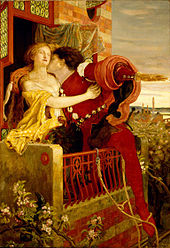 An 1870 oil painting by Ford Madox Brown depicting Romeo and Juliet's famous balcony scene
An 1870 oil painting by Ford Madox Brown depicting Romeo and Juliet's famous balcony scene
In the beginning of the play, Romeo pines for an unrequited love, Rosaline. To cheer him up, his friends Benvolio and Mercutio take him to the Capulets' celebration in disguise, where he meets and falls in love with the Capulets' only daughter, Juliet. Later that night, he and Juliet meet secretly and pledge to marry, despite their families' long-standing feud. They marry the following day, but their union is soon thrown into chaos by their families; Juliet's cousin Tybalt duels and kills Romeo's friend Mercutio, throwing Romeo into such a rage that he kills Tybalt, and the Prince of Verona subsequently banishes him. Meanwhile, Juliet's father plans to marry her off to Paris, a local aristocrat, within the next few days, threatening to turn her out on the streets if she doesn't follow through. Desperate, Juliet begs Romeo's confidant, Friar Laurence, to help her to escape the forced marriage. Laurence does so by giving her a potion that puts her in a death-like coma. The plan works, but too soon for Romeo to learn of it; he genuinely believes Juliet to be dead, and so resolves to commit suicide. Romeo's final words were "Thus with a kiss I die".[14] He kills himself at Juliet's grave, moments before she awakes; she kills herself in turn shortly thereafter.
Benvolio
Main article: BenvolioHe is Montague's nephew and Romeo's cousin. He and Romeo are both friends of Mercutio, a kinsman to the Prince. Benvolio seems to have little sympathy with the feud, trying unsuccessfully to back down from a fight with Tybalt, and the duels that end in Mercutio and Tybalt's death. Benvolio spends most of Act I attempting to distract his cousin from his infatuation with Rosaline, but following the first appearance of Mercutio in I.iv, he and Mercutio become more closely aligned until III.i. In that scene, he drags the fatally wounded Mercutio offstage, before returning to inform Romeo of Mercutio's death and the Prince of the course of Mercutio's and Tybalt's deaths. Benvolio then disappears from the play (though, as a Montague, he may implicitly be included in the stage direction in the final scene "Enter Lord Montague and others", and he is sometimes doubled with Balthasar). Though he ultimately disappears from the play without much notice, he is a crucial character if only that he is the only child of the new generation from either family to survive the play (as Romeo, Juliet, Paris, Mercutio, and Tybalt are dead).
Abram
Abram (sometimes referred to as Abraham) is a servant of the Montague household.
Balthasar
Balthasar is Romeo's servant and trusted friend. While he is not directly referenced in the first scene of the play, the directions call for two Montague servants to quarrel with Sampson and Gregory. He then comes back in Act 4 Scene 5 telling Romeo about Juliet's death. In the last scene (Act 5 Scene 3) in the graveyard, he tries to stop Romeo from entering the vault but he gives up and lets him go into the tomb. Romeo gives him money saying that he is a good friend and then he hides in the graveyard despite Romeo telling him not to. Later Friar Laurence runs past Balthasar and asks him where Romeo is and Balthasar tells him that he is inside the tomb. Then the Prince calls him in and asks him questions about why was he there. He gives the Prince the letter that explains why Romeo killed himself. He and Abram are the only servants mentioned by name in Shakespeare's character list.[dubious ]
Other characters
Friar Laurence
Main article: Friar LaurenceFriar Laurence plays the part of an advisor to Romeo, along with aiding in major plot developments.
Alone, the innocent Friar gives us foreshadowing with his soliloquy about plants and their similarities to humans.[15] When Romeo requests that the Friar marry him to Juliet, he is shocked, because only days before, Romeo had been infatuated with Rosaline,[16] a woman who did not return his love. Nevertheless, Friar Laurence decides to marry Romeo and Juliet in the attempt to end the civil feud between the Capulets and the Montagues.[17]
When Romeo is banished[18] and flees to Mantua for murdering Tybalt[19] (who had previously murdered Mercutio), he tries to help the two lovers get back together using a death-emulating potion to fake Juliet's death.[20] The friar's letter to Romeo does not reach him because the people of Mantua suspect the messenger came from a house where the plague reigns,[21] and the Friar is unable to arrive at the Capulet's monument in time. Romeo kills Count Paris,[22] whom he finds weeping near Juliet's corpse, then commits suicide,[23] by drinking poison that he bought from an impoverished apothecary,[24] over what he thinks is Juliet's dead body. Friar Laurence arrives just as Juliet awakes from her chemically-induced slumber.[25] He urges Juliet not to be rash, and to join a society of nuns,[26] but he hears a noise from outside and then flees from the tomb. Juliet then kills herself with Romeo's dagger, completing the tragedy. The Friar is forced to return to the tomb, where he recounts the entire story to Prince Escalus, and all the Montagues and Capulets. As he finishes, the prince proclaims, "We have still known thee for a holy man".
Chorus
A Chorus gives the opening prologue and one other speech, both in the form of a Shakespearean sonnet.
The Chorus is an omniscient character. It appears at the top of the play to fill the audience in on the ancient quarrel between the, "Two households, both alike in dignity / In fair Verona, where we lay our scene". It returns as a prologue to act two to foreshadow the tragic turn of events about to befall the new romance between the title characters.
Friar John
Friar John is a fellow Franciscan and a good friend to Friar Laurence. John is the messenger sent to deliver a letter to Romeo in Mantua explaining that Juliet is not actually dead. However, is met by a friend on the way in a town being plagued by the pestilence. The two are walled up in a house, as the villagers fear infection, and he cannot find a replacement messenger. He returns the message to Laurence, unaware of its dire importance. Scholars have pointed out that the vagueness with which Friar John is described makes his delay conveniently believable. As a monk, walking would have been his mode of transport, in contrast with Balthasar, who reaches Romeo first, possibly on horseback, with news of Juliet's apparent death. This makes the plague and quarantine unnecessary to the plot. Walpole in particular considers the plague an extemporaneous element in the play, and overly dramatic, whereas more detail on Friar John's journey would have explained the delay in a more effective way.[27]
Apothecary
Pharmacist/druggist who reluctantly sells Romeo poison. The Apothecary is a poor potion maker of Mantua.
Watchmen
The Watch of Verona takes the form of three watchmen. The First Watch appears to be the constable, giving orders to the Second and Third to "search about the churchyard!" Unusual for a Shakespearean watch group, they appear to be a relatively intelligent unit, managing to capture and detain Balthasar and Friar Laurence in the churchyard. They then testify to the Prince to their role in the murder and suicide scene.
Musicians
Three musicians for Juliet's wedding appear in act four, scene five in a brief comic scene, refusing to play a song called "Heart's ease" for Peter. They are referred to by the names of Simon Catling, Hugh Rebeck, and James Soundpost.[28]
Citizens of Verona
A number of citizens emerge during Act I, Scene I to break apart the fight between some Capulet and Montague servants. They appear again in Act III, Scene I to discover the slain body of Tybalt, at which point they place Benvolio under citizen's arrest until the Prince's swift entrance.
Unseen and ghost characters
Petruchio
Petruchio is a guest at the Capulet feast. He is notable only in that he is the only ghost character confirmed by Shakespeare to be present. When the party ends and Juliet inquires towards Romeo's identity, the Nurse attempts to avoid the subject by answering that Juliet is pointing at "the young Petruchio". Later, he is with Tybalt when he fatally wounds Mercutio, and a few scripts identify a Capulet with one line by that name. Petruchio is also the name of a major character in Shakespeare's earlier work, The Taming of the Shrew.
Rosaline
Main article: RosalineRosaline (
 /ˈrɒzəlɪn/ or /ˈrɒzəliːn/[29]) is an unseen character and niece of Capulet. Although silent, her role is important: her lover, Romeo, first spots Juliet while trying to catch a glimpse of Rosaline at a Capulet gathering.
/ˈrɒzəlɪn/ or /ˈrɒzəliːn/[29]) is an unseen character and niece of Capulet. Although silent, her role is important: her lover, Romeo, first spots Juliet while trying to catch a glimpse of Rosaline at a Capulet gathering.Scholars generally compare Romeo's short-lived love of Rosaline with his later love of Juliet. The poetry he writes for Rosaline is much weaker than that for Juliet. Scholars believe his early experience with Rosaline prepares him for his relationship with Juliet. Later performances of Romeo and Juliet have painted different pictures of Romeo and Rosaline's relationship, with filmmakers experimenting by making Rosaline a more visible character.
Valentine
Valentine is Mercutio's brother, briefly mentioned as a guest at the Capulet feast where Romeo and Juliet meet. He is a ghost character with no speaking parts, and his only possible appearance is at the Capulet feast among the guests. "Valentine" has been taken to mean "lover" or "brother", and is associated with these attributes in several stories and histories. Scholars have pointed out that Valentine is more strongly connected to major character than other ghosts, as he is given a direct connection to his brother. Although he has a very small role in Shakespeare's play, earlier versions of the story gave him no role or mention at all. In fact, they gave even Mercutio a very minor role. Shakespeare was the first English dramatist to use the name "Valentine" on stage, in his earlier plays, Titus Andronicus and Two Gentlemen of Verona. In Titus, Valentine plays a minor role, but in Two Gentlemen, he is one of the title characters. Incidentally, the Valentine of Two Gentlemen borrows heavily from Arthur Brooke's Romeus in The Tragical History of Romeus and Juliet, which Shakespeare later used to create Romeo and Juliet. Brooke's version made Mercutio a rival for Juliet's love. Shakespeare's addition of Valentine as Mercutio's brother diffuses this rivalry. Thus, because the first time we hear of Mercutio he is associated with Valentine, rather than Juliet, he is changed from a rival to a friend and brotherly figure of Romeo.[30]
References
- ^ Gray, Zachary (1754). Critical, historical, and explanatory notes on Shakespeare. 2. London: Richard Manby. p. 265. OCLC 3788825.
- ^ de Somogyi, Nick (2001). Twelfth Night. London: Nick Hern Books. p. 160. ISBN 1 85459 622 5. "‘County’, an alternative form of ‘count’, to restore the metre, … as for example in Romeo and Juliet ‘Mercutio’s kinsman, noble County Paris’"
- ^ a b Moore, Olin H. (July 1930). "The Origins of the Legend of Romeo and Juliet in Italy". Speculum (Medieval Academy of America) 5 (3): 264–277. doi:10.2307/2848744. JSTOR 2848744.
- ^ a b c Meagher, John C. (2003). "Speech headings and stage directions". Pursuing Shakespeare's dramaturgy: some contexts, resources, and strategies in his playmaking. Madison, NJ: Fairleigh Dickinson University Press. p. 81. ISBN 0-8386-3993-3.
- ^ Act 3 Scene 5
- ^ Halio, Jay. Romeo and Juliet. Westport: Greenwood Press, 1998. pg. 1 ISBN 0-313-30089-5
- ^ Moore (1937: 38–44).
- ^ Hosley (1965: 168).
- ^ Moore (1930: 264–277)
- ^ Bevington, David M.. How to read a Shakespeare play. Malden, MA: Blackwell. pp. 44–45. ISBN 9781405113953.
- ^ Romeo and Juliet, Act 3, Scene 2
- ^ II.iv.157-158
- ^ a b Hager, Alan. Understanding Romeo and Juliet. Westport: Greenwood Press, 1999. pgs. 17-20. ISBN 0-313-29616-2
- ^ "The Complete Works of William Shakespeare - The Tragedy of Romeo and Juliet", Project Gutenberg
- ^ Shakespeare: Romeo and Juliet; 2.3.1-22
- ^ Shakespeare: Romeo and Juliet; 2.3.180-81
- ^ Shakespeare: Romeo and Juliet; 2.3.26-31
- ^ Shakespeare: Romeo and Juliet; 3.1.188-99
- ^ Shakespeare: Romeo and Juliet; 3.1.87-93
- ^ Shakespeare: Romeo and Juliet; 3.5.91-101
- ^ Shakespeare: Romeo and Juliet; 4.5.5-12
- ^ Shakespeare: Romeo and Juliet; 5.2.72-73
- ^ Shakespeare: Romeo and Juliet; 5.2.119-120
- ^ Shakespeare: Romeo and Juliet; 4.5.66-79
- ^ Shakespeare: Romeo and Juliet; 5.2.148-50
- ^ Shakespeare: Romeo and Juliet; 5.2.156-160
- ^ Walpole, V. "The Plague in 'Romeo and Juliet' " The Modern Language Review. (Apr 1928) 23.2 pgs. 213-215
- ^ Shakespeare: Romeo and Juliet; 4.5.125-129
- ^ Upton, Clive et al, ed (2001). The Oxford Dictionary of Pronunciation for Current English. Oxford University Press. p. 895. ISBN 9780198631569.
- ^ Porter, Joseph A. "Mercutio's Brother." South Atlantic Review 49.4 (1984): 31-41.
Categories:- Lists of theatre characters
- Shakespearean characters
- Fictional Italian people in literature
- Characters in Romeo and Juliet
Wikimedia Foundation. 2010.

